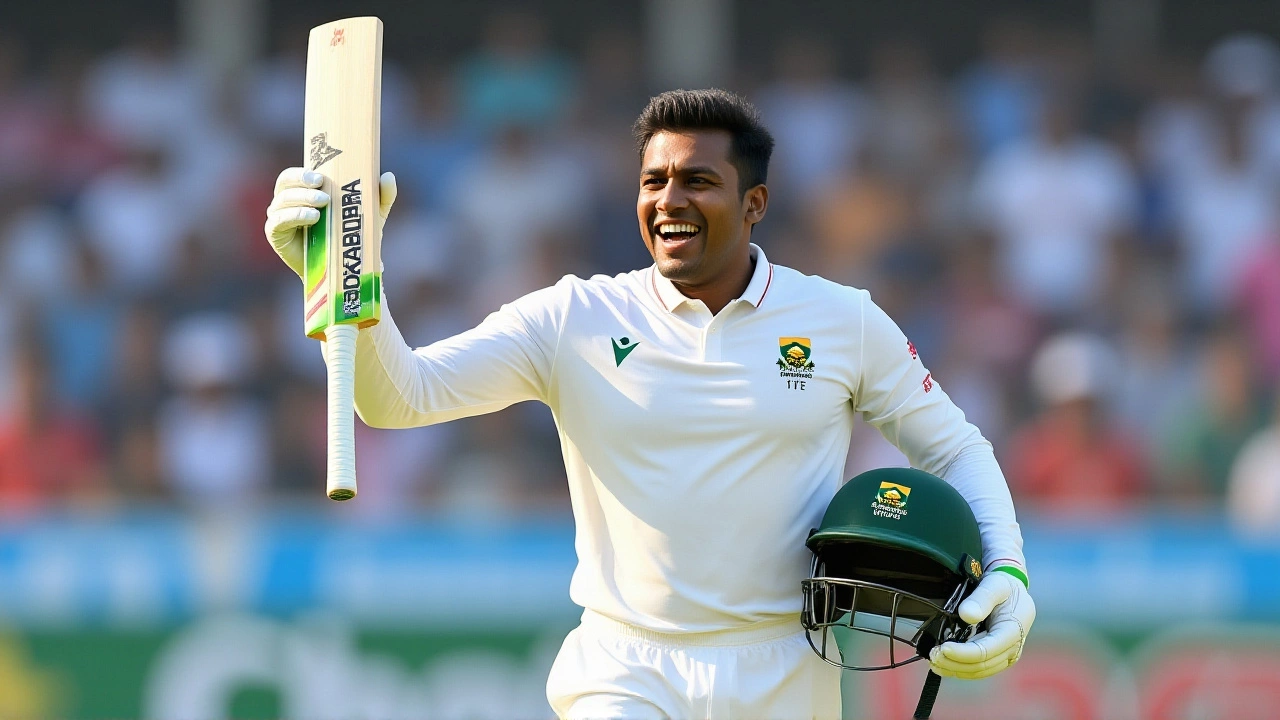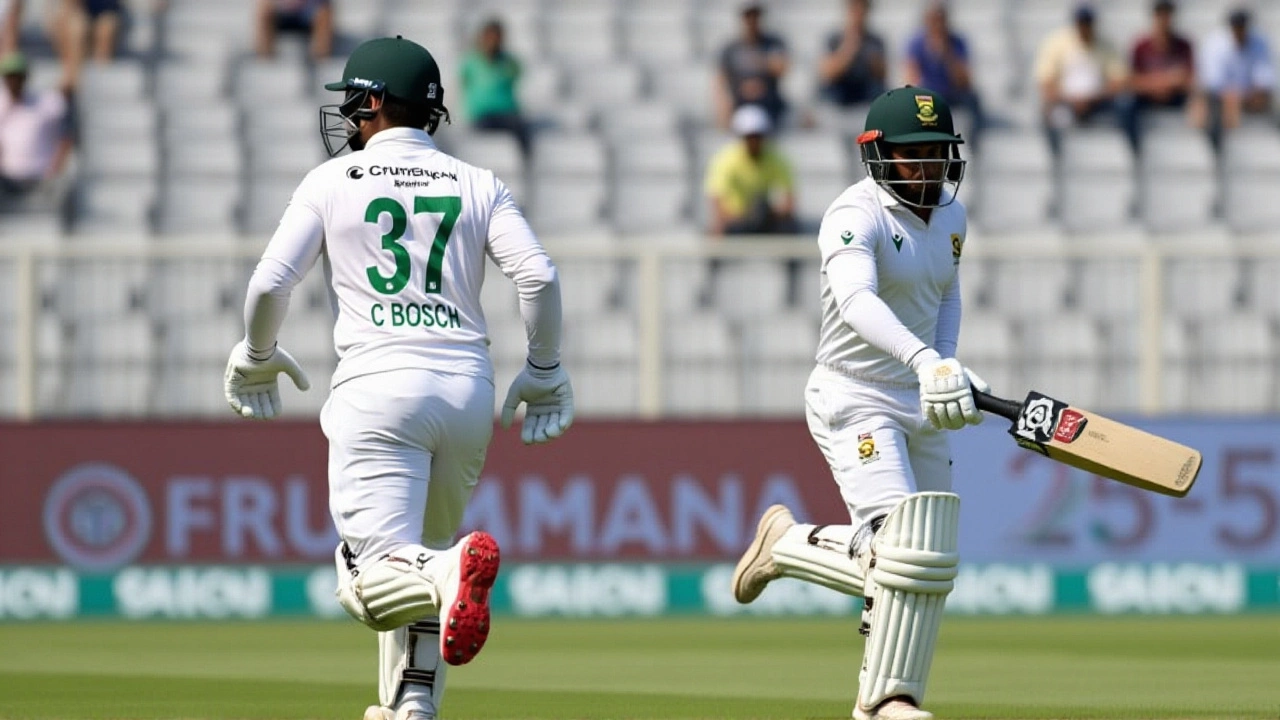South Africa pulled off a historic win on Indian soil on Sunday, November 16, 2025, defeating India by 30 runs at Eden Gardens in Kolkata — their first Test victory in India in 15 years. The win came amid dramatic circumstances: India’s captain, Shubman Gill, was hospitalized with neck spasms and couldn’t bat in the second innings, leaving Rishabh Pant to lead a crumbling batting lineup. South Africa, led by Temba Bavuma, who now has 10 wins in 11 Tests as captain, sealed the match with a masterclass in spin and seam bowling. India, chasing 124, collapsed to 93 all out, their lowest total in a fourth-innings chase since 2013.
A Bowler’s Paradise at Eden Gardens
The match was a bowler’s dream. After South Africa were reduced to 91-7 on day two, Temba Bavuma held the innings together with an unbeaten 55 — the only half-century of the match. Corbin Bosch added 25, but it was the spinners and fast bowlers who turned the tide. Off-spinner Simon Harmer, playing for Essex County Cricket Club in England, returned match figures of eight wickets. He dismantled India’s middle order on day three, with the pitch offering sharp turn and inconsistent bounce. Meanwhile, fast bowler Marco Jansen struck early, removing openers Yashasvi Jaiswal (0) and KL Rahul (1) before lunch on the final day. India slumped to 1-2, then 38-4, as Jansen’s pace and Harmer’s guile exposed fragile technique against high-quality bowling.
India’s Captain Out, Team in Chaos
The shock of Shubman Gill’s hospitalization sent ripples through the Indian camp. The 25-year-old, named captain by the Board of Control for Cricket in India (BCCI) just weeks before the tour, was taken to a Kolkata hospital with severe neck spasms after a long day in the field. He was ruled out of batting, leaving Pant to step up with a depleted top order. The BCCI, headquartered at Wankhede Stadium in Mumbai, confirmed Gill was under observation but expected to recover ahead of the second Test. Still, the absence of their captain — and the psychological blow of losing him mid-chase — was palpable. Fans at Eden Gardens, one of cricket’s most passionate venues, fell silent as wickets tumbled.
Harmer’s Masterclass and Bavuma’s Leadership
It was Simon Harmer who delivered the knockout punch. His eight-wicket haul — including key dismissals of Ravindra Jadeja and Axar Patel — was the defining performance of the match. Jadeja, who had earlier taken four wickets to bowl South Africa out for 153, couldn’t replicate his heroics under pressure. Harmer, 35, has been a quiet workhorse for South Africa since his recall in 2023, and this was his statement on the toughest touring pitch in the world. Meanwhile, Bavuma, 34, showed why he’s one of the most composed leaders in modern cricket. His 55 came after his side was on the brink of collapse, and he stayed calm while the rest of the team floundered. “He didn’t just save the innings,” said former South African captain Graeme Smith on Sky Sports. “He gave his bowlers something to defend — and they took full advantage.”

Historical Weight and a Series on the Line
This win isn’t just about one match. South Africa hadn’t won a Test in India since 2010 — a drought spanning 15 years and 17 matches. Their last series win in India? A 2-0 triumph in 2000, when they beat India in Mumbai and Bengaluru. Now, with a 1-0 lead in this two-Test series, they have a real shot at repeating history. “It’s not just about breaking a streak,” said former Indian spinner Harbhajan Singh. “It’s about proving you can win where no one else can. That’s what makes this special.” The Cricket South Africa headquarters in Cape Town celebrated the result with quiet pride. The team now heads to an undisclosed venue for the second Test, with the chance to clinch their first series win in India in 25 years.
What the Pitch and the Pre-Match Hints Revealed
Before the match, former Indian captain Sourav Ganguly, now president of the Cricket Association of Bengal (CAB), had dropped a hint: the Kolkata pitch was being prepared as a “rank turner.” He was right. The surface cracked under pressure, and spinners dominated after the first 20 overs. The umpiring team — Craig Brian Gaffaney and Richard James Tucker from New Zealand, with Richard Alan Kettleborough as TV umpire — made no controversial calls, but the conditions did the talking. The crowd of 66,349 at Eden Gardens, the oldest cricket ground in India, was stunned into silence by the final collapse. Even the BCCI’s match referee, unnamed but experienced, reportedly praised South Africa’s discipline.

What’s Next?
The second Test is scheduled for late November, though the venue remains unannounced. South Africa will look to build on momentum, while India must address their top-order fragility and Gill’s fitness. If Gill can’t play, Pant may retain the captaincy — a move that could reshape India’s leadership for years to come. For South Africa, this win is more than a statistic. It’s a signal: they’ve found their rhythm in Asia, and they’re not backing down.
Frequently Asked Questions
How rare is a Test win for South Africa in India?
South Africa’s victory on November 16, 2025, was their first Test win in India since 2010 — ending a 15-year drought across 17 matches. Their last series win in India was in 2000, when they won 2-0 in Mumbai and Bengaluru. Only two other teams — Australia and England — have won Test series in India more recently than South Africa. This win puts them in elite company.
Why was Simon Harmer so effective in this match?
Harmer exploited the deteriorating pitch at Eden Gardens, using sharp turn and subtle variations in pace. His eight wickets included key dismissals of India’s spinners and middle-order stabilizers. He bowled 34 overs across both innings, maintaining line and length under pressure. His experience in county cricket — especially on turning tracks in England — gave him an edge over India’s batsmen, who struggled to read his flight and spin.
What impact does Shubman Gill’s injury have on India’s future?
Gill’s neck spasms raise concerns about his ability to handle the physical demands of Test cricket, especially on wearing pitches. If he misses the second Test, Rishabh Pant could be named permanent captain — a major shift for India’s leadership. Gill, 25, was seen as the future of Indian Test cricket; his absence may force the BCCI to reconsider their long-term captaincy plan and batting order structure.
What does this result mean for South Africa’s global standing?
This win cements South Africa as one of the most consistent Test teams in the world under Bavuma. Winning in India is the ultimate benchmark, and doing so with a 10th win in 11 Tests as captain shows remarkable consistency. They now sit third in the ICC Test rankings, and a series win here would propel them into the top two — their highest position since 2018.
How did the Eden Gardens pitch influence the outcome?
The pitch, prepared by the Cricket Association of Bengal, cracked significantly after day two, offering sharp turn and uneven bounce. Spinners dominated after the first 20 overs, and even pace bowlers like Jansen found extra bounce. The surface favored patience and precision — qualities South Africa had in abundance. India’s batsmen, used to flatter tracks at home, were unprepared for the aggression of the conditions.
Who were the key umpires, and did their decisions affect the match?
Umpires Craig Brian Gaffaney and Richard James Tucker (both from New Zealand) and TV umpire Richard Alan Kettleborough (England) oversaw the match without controversy. Their decisions were widely regarded as accurate, with no major DRS referrals overturned. The match referee, though unnamed, reportedly commended both teams for sportsmanship. The real story wasn’t the umpiring — it was the pitch and the bowling.
